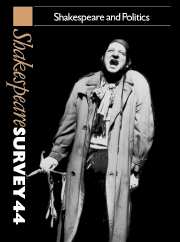Book contents
- Frontmatter
- Shakespeare and Politics
- Language, Politics, and Poverty in Shakespearian Drama
- Some Versions of Coup d’état, Rebellion and Revolution
- Woman, Language, and History in The Rape of Lucrece
- Love in Venice
- Two Kingdoms for Half-a-Crown
- ‘Fashion it thus’: Julius Caesar and the Politics of Theatrical Representation
- ’Demystifying the Mystery of State’: King Lear and the World Upside Down
- Tragedy, King Lear, and the Politics of the Heart
- The Politics of Shakespeare Production
- Shakespeare in the Trenches
- Shakespeare’s Earliest Editor, Ralph Crane
- Shakespeare’s Falconry
- Telling the Story of Shakespeare’s Playhouse World
- Shakespeare Performances in England, 1989–90
- Professional Shakespeare Productions in the British Isles January-December 1989
- Critical Studies
- Shakespeare’s Life, Times, and Stage
- Editions and Textual Studies
- Books Received
- Index
Shakespeare and Politics
Published online by Cambridge University Press: 28 March 2007
- Frontmatter
- Shakespeare and Politics
- Language, Politics, and Poverty in Shakespearian Drama
- Some Versions of Coup d’état, Rebellion and Revolution
- Woman, Language, and History in The Rape of Lucrece
- Love in Venice
- Two Kingdoms for Half-a-Crown
- ‘Fashion it thus’: Julius Caesar and the Politics of Theatrical Representation
- ’Demystifying the Mystery of State’: King Lear and the World Upside Down
- Tragedy, King Lear, and the Politics of the Heart
- The Politics of Shakespeare Production
- Shakespeare in the Trenches
- Shakespeare’s Earliest Editor, Ralph Crane
- Shakespeare’s Falconry
- Telling the Story of Shakespeare’s Playhouse World
- Shakespeare Performances in England, 1989–90
- Professional Shakespeare Productions in the British Isles January-December 1989
- Critical Studies
- Shakespeare’s Life, Times, and Stage
- Editions and Textual Studies
- Books Received
- Index
Summary
There has not been an age so sympathetic as the present to the study of the political content and the political context of Shakespeare’s plays. Politics are now everywhere in literary criticism. In Shakespeare’s time men followed Aristotle and applied the language of what we regard as private ethics to the conduct of public life: today’s critics, when they give currency to a term such as ‘sexual politics’, extend the language of public life to private ethics. Even if we restrict ourselves, as I shall, to a more traditional definition of politics, we notice the transformation of critical approaches that the past half century has brought. Who would now doubt that the behaviour of men in public life was a theme to engage Shakespeare’s interest, and to stretch his powers, to the full? Who would assume, as John Palmer did in his Political Characters of Shakespeare in 1945, that Shakespeare was ‘forced’ by the public demand for history plays to ‘take the political field’ (p. vi)?
On the face of it, the new political awareness ought to add to our understanding of Shakespeare. In the sixteenth and seventeenth centuries the relationship between literature and politics had an intimacy which the modern world has lost. Writers and politicians were so often the same people. The interaction of political and literary aspirations in the career of a Sir Thomas More or a Sir Thomas Wyatt or a Sir Philip Sidney, or of a John Milton or an Andrew Marvell, is so insistent that we cannot hope to understand the one without the other. Our appreciation of major writings of the sixteenth and seventeenth centuries — of Utopia, of Arcadia, of The Faerie Queene, of Samson Agonistes — can be profoundly enhanced by a knowledge of the political circumstances in which they were written. Why, then, is the same not true of Shakespeare's plays? A knowledge of Renaissance politics can, as I hope to intimate, illustrate themes of those plays. But it will not take us to their heart.
- Type
- Chapter
- Information
- Shakespeare Survey , pp. 1 - 16Publisher: Cambridge University PressPrint publication year: 1991
- 2
- Cited by

